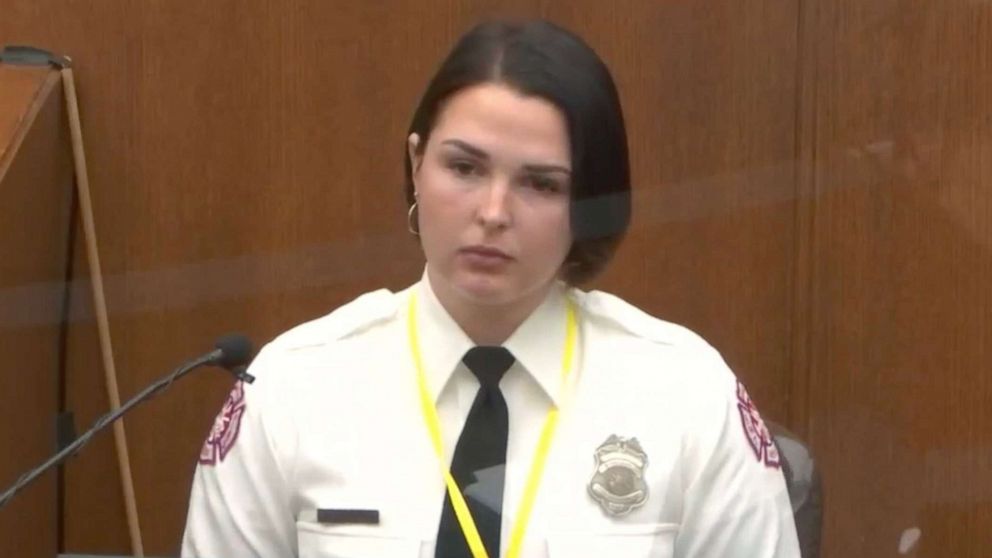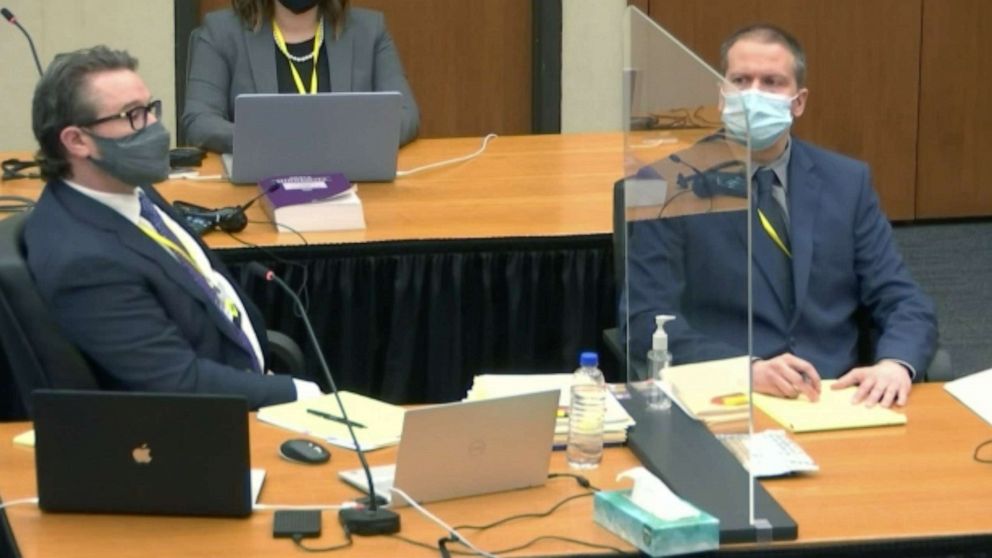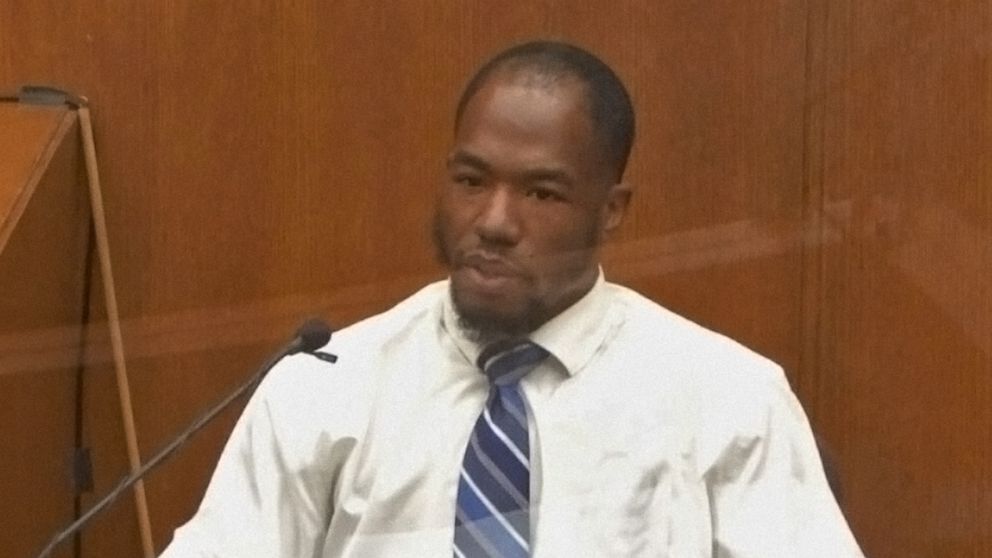Key takeaways from Day 2 of the Derek Chauvin trial
A Minneapolis firefighter broke down in tears on Tuesday at the murder trial of Derek Chauvin, testifying that she felt helpless and "desperate" when the police prevented her from giving medical aid to George Floyd as he lay handcuffed on the ground in physical distress with the weight of three police officers on top of him.
Genevieve Hansen, 28, who has been a firefighter for two years and holds both state and national certifications in cardiopulmonary resuscitation, said that when she first noticed Floyd's condition as she walked up to the scene of his attempted arrest on May 25, 2020, she was immediately concerned.
"I was concerned to see a handcuffed man who was not moving with officers with their whole body weight on his back and a crowd that was stressed out," Hansen, wearing her dress firefighter's uniform, testified in Hennepin County District Court in Minneapolis.
She said she was off duty that day and not in uniform when she walked over to the officers, identified herself as a firefighter and asked if she could provide medical help or at least show them how to check for a pulse and perform first aid.
"It didn't take me long to realize that he had an altered level of consciousness," she said of Floyd. "In our training, that is the first time that somebody needs medical attention. So my attention moved from Mr. Floyd to how can I gain access to this patient and give him medical attention or direct the officers."
Hansen described Floyd's face as "puffy and swollen" and that she saw fluid she assumed was urine coming from Floyd's body, explaining that patients often release their bladder when they die.
"What I needed to know is whether or not he had a pulse anymore," she said.

Hansen said she was immediately ordered by officer Tou Thao to get on the sidewalk and was told "if you really are a Minneapolis firefighter you know better than to get involved."
"First I was worried that he wasn't going to believe me and not let me help," she said. "That's not right. That's exactly what I should have done. There was no medical assistance on scene and I got there and I could have given medical assistance."
Instead, she said she could only watch as Floyd's life faded away and call 911 to report what she had just witnessed.
When prosecutor Matthew Frank asked how it made her feel to not be allowed to help Floyd, Hansen said, "totally distressed."
"In my memory, I tried different tactics of calm and reasoning. I tried to be assertive. I pleaded and was desperate," Hansen said breaking into tears.
She said she began raising her voice and directed foul language at the officers.
"I was desperate to help and wasn't getting what I needed to do, which was gaining access," she said.
She said that at the same time she saw Chauvin continuing to press his knee into the back of Floyd's neck.
Hansen, who video recorded some of the episode, said Chauvin, who did not speak to her, "seemed very comfortable" with the majority of his weight balanced on top of Floyd's neck.
"In my memory, he had his hand in his pocket he looked so comfortable," Hansen said.
Under cross-examination from Chauvin's attorney, Eric Nelson, Hansen conceded that she didn't know that paramedics had already been called and that she was unaware if the officers on top of Floyd had checked his pulse.
Nelson also asked if she and the other bystanders were getting angry and hostile toward the officers.
"I don't know if you've seen anyone killed but it's upsetting," she answered.
Nelson objected to her answer and Judge Peter Cahill had it stricken from the record and after dismissing the jury for the day, the judge scolded Hansen for being argumentative with the defense attorney.
She is scheduled to return to court on Wednesday to resume her testimony.
Chauvin is charged with second-degree attempted murder, third-degree murder and manslaughter. He has pleaded not guilty.
He is being tried separately from three other former police officers involved in Floyd's death. Thao, J. Alexander Kueng and Thomas Lane are each charged with second-degree aiding and abetting felony murder and second-degree aiding and abetting manslaughter. They have pleaded not guilty and are scheduled to go on trial in August.
'He had a cold look, heartless'
Also called to testify on Tuesday was a teenage bystander who took a viral video of Chauvin with his knee on Floyd's neck.
To protect her identity, Judge Cahill allowed the young witness, who is now 18, to testify off-camera in the televised trial and to use only her first name, Darnella, during her stint on the witness stand.
Asked by prosecutor Jerry Blackwell how her life has changed since she took the 10-minute video and uploaded it on Facebook, she struggled through tears to explain.
"When I look at George Floyd, I look at my dad, I look at my brothers, I look at my cousins, my uncles because they're all Black," Darnella testified. "And I look at that and I look at how that could have been one of them."
She said she has spent nights agonizing over what she saw on May 25, 2020, and wishes she could have done more to save Floyd, a 46-year-old Black man she had never met.

"I stayed up apologizing and apologizing to George Floyd for not doing more and not physically interacting, not saving his life," Darnella said.
She said she came upon the incident while walking her 9-year-old cousin to the Cup Foods store to buy snacks, and asked her cousin to go into the store while she circled back to where police officers had the handcuffed Floyd prone on the ground next to a patrol car. She identified Chauvin in court as the officer she saw with his knee on the back of Floyd's neck.
Darnella said she immediately pulled out her cellphone and started recording video.
Asked by Blackwell to describe what she saw, Darnella said, "A man terrified, scared, begging for his life."
"It wasn't right," she said. "He was suffering. He was in pain. I heard George Floyd saying, 'I can't breathe. Please get off of me.' He cried for his mom. It seemed like he knew it was over for him."
She said that when she started recording, she was the only bystander around. Soon a crowd gathered and began yelling at the officers to get off of Floyd, she said.
Asked by Blackwell if she witnessed any violence at that particular instance, she said, "Yes, from the cops."
She said that the more bystanders pleaded with Chauvin to relent, the more he seemed to use force.
"If anything, he was actually kneeling harder. He was shoving his knee into his neck," she said of Chauvin.
She said at one point, Chauvin and a fellow officer, Tou Thao, put their hands on their Mace canister, apparently to prompt the crowd to back up as witnesses grew louder and shouted expletives at the officers. She said nothing the bystanders said to Chauvin seemed to matter.
"He just stared at us, looked at us," she said. "He had a cold look, heartless. He didn't care."
She said Chauvin refused to let up even when paramedics initially arrived and attempted to check Floyd's pulse.
She said a paramedic "checked his pulse first while Chauvin's knee still remained on George Floyd's neck."
Under cross-examination from defense attorney Nelson, Darnella conceded that she did not witness any part of what happened prior to her arrival, nor did she hear the conversations between the officers.
Nelson asked her about all the cursing and shouting at the officers from bystanders, asking if the crowd became louder and hostile as the incident went on.
"More so as he [Floyd] was becoming more unresponsive," she said.
Darnella's 9-year-old cousin was also called to testify off-camera. She said that when she emerged from Cup Foods, she saw Chauvin with his knee on Floyd's neck. When an ambulance arrived, she said she saw paramedics ask Chauvin to get up so they could check Floyd's pulse.
"I was sad and kind of mad cause I felt like he was stopping him from breathing," she said of Chauvin.
Mixed martial arts fighter says Chauvin used 'blood choke'
A professional mixed martial arts fighter who testified in graphic detail about seeing Floyd's life being squeezed out of him by a "blood choke" returned to the witness stand on Tuesday, presenting the defense with what legal experts said was an uphill battle to discredit him.
Donald Williams II -- a 5-foot-6, 135-pound bantamweight who fights under the nickname "DWill II" -- testified for the prosecution on the first day of the trial. He said he was headed to the Cup Foods store in Minneapolis when he was drawn to a commotion. He said he saw police officers pinning a handcuffed Black man to the ground and Chauvin, who is white, grinding his knee into the back of Floyd's neck.
Williams testified that he has been a competitive wrestler since the seventh grade and turned professional mixed martial arts fighter in 2009. Given his training, he was allowed leeway by Judge Cahill to describe the hold he said he recognized Chauvin was using on Floyd.

He said Chauvin was using a "blood choke," applying pressure with his knee on the side of Floyd's neck and cutting off the blood flowing to his head.
"His breathing was getting tremendously heavy and tremendously harder for him to breathe," Williams said of Floyd. "You actually could hear him, you could see him struggling to actually gasp for air while he was trying to breathe. He barely could move while he was trying to get air."
In his opening argument, prosecutor Blackwell played for the jury a bystander video showing Chauvin with his knee on the back of Floyd's neck for what he said was 9 minutes and 29 seconds as two other officers helped hold Floyd down. Another, identified as Thao, kept Williams and other witnesses at bay as they pleaded with Chauvin to relent.
Blackwell told the jury that Chauvin "betrayed his badge" when he dug his knee into Floyd's neck "until the very life was squeezed out of him."
Williams said he locked eyes with Chauvin at one point during the street encounter.
"He looked at me. It was the only time he looked at me when I said it was a blood choke," Williams testified.
He said Chauvin was also using what fighters call a "shimmy" to tighten his hold on Floyd.
Williams added that he had gone fishing earlier that day with his son. Seeing the life drain out of Floyd reminded him of how he suffocated the fish in a plastic bag.
He said he saw Floyd "slowly fade away like the fish in the bag" with his eyes rolling back in his head until he stopped begging for his life and went unconscious.
During cross-examination, Nelson grilled Williams about the foul language he directed at Chauvin and Thao, asking if he and other bystanders were getting angry at the officers.
Williams, who also worked in security and as a nightclub bouncer, said he was angry because the officers were not listening to him. He tried to maintain his "professionalism" and in one instance stepped off the curb to approach the officer only for Thao to place his hand on his chest and direct him back.
On direct examination from prosecutor Matthew Frank, Williams said he called 911 after an unresponsive Floyd was taken away from the scene in an ambulance.
Asked by Frank, who played Williams' 911 call for the jury, why he reported what he saw to authorities, Williams replied, "Because I believed I witnessed a murder."
ABC News' Whitney Lloyd contributed to this report.



